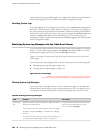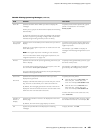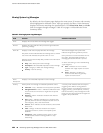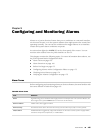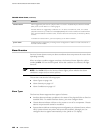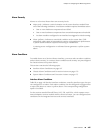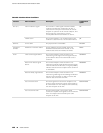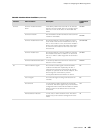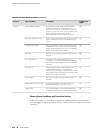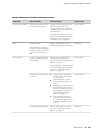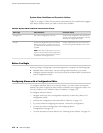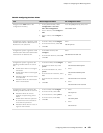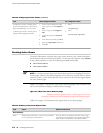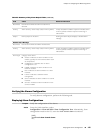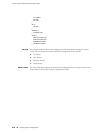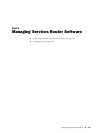
Table 89: Interface Alarm Conditions (continued)
Configuration
Option
DescriptionAlarm ConditionInterface
ais
The normal T3 traffic signal contained a defect
condition and has been replaced by the AIS. A
transmission interruption occurred at the remote
endpoint or upstream of the remote endpoint. This
all-ones signal is transmitted to prevent
consequential downstream failures or alarms.
Alarm indication signalT3 (DS3)
exz
The bit stream received from the upstream host has
more consecutive zeros than are allowed in a T3
frame.
Excessive number of zeros
ferf
The remote endpoint of the connection has failed.
A FERF differs from a yellow alarm, because the
failure can be any failure, not just an out-of-frame
(OOF) or loss-of-signal (LOS) failure.
Far-end receive failure
idle
The Idle signal is being received from the remote
endpoint.
Idle alarm
lcv
Either the line encoding along the T3 link is
corrupted, or a mismatch between the encoding at
the local and remote endpoints of a T3 connection
occurred.
Line code violation
lof
An out-of-frame (OOF) or loss-of-signal (LOS)
condition has existed for 10 seconds. The
loss-of-frame (LOF) failure is cleared when no OOF
or LOS defects have occurred for 20 seconds. A LOF
failure is also called a red failure.
Loss of frame
los
No remote T3 signal is being received at the T3
interface.
Loss of signal
pll
The clocking signals for the local and remote
endpoints no longer operate in lock-step.
Phase-locked loop out of lock
ylw
The remote endpoint is in red alarm failure. This
condition is also known as a far end alarm failure.
Yellow alarm
Chassis Alarm Conditions and Corrective Actions
Table 90 on page 171 lists chassis components with preset alarms, the conditions
that can trigger an alarm, the alarm severity, and the action you take to correct the
condition.
170 ■ Alarm Overview
J-series™ Services Router Administration Guide



